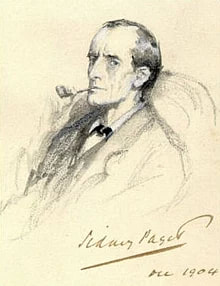
Sherlock Holmes is of course one of the greatest fictional heroes of all time, up there with Dracula in terms of being both one of the most adapted characters of all time and ruined by Steven Moffat.
There have been so many variations over the years, from fighting World War II to fighting Matt Frewer’s accent, he has covered ever period and trend from his original Victorian era England to the 21st century.
Mr Denyer was kind enough to ask me what my five favourite adaptations of Holmes are, which I’ve cheated a bit to stop it being my five favourite Brett adaptations. It’s also basically a very personal list, so there’s going to be at least two things here that will make serious fans roll their eyes, for which I offer no apologies.
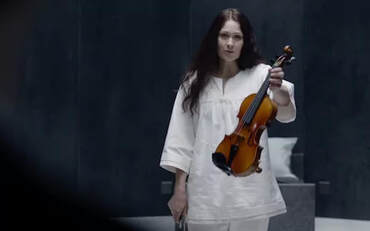
It’s a bit like kicking the rotting corpse of a dead donkey to be disparaging of Sherlock at this stage. Though I suspect once there’s a bit more distance from that terrible last episode, its fans will think back more fondly on it.
I’m afraid though that I could never get on with it. Casting of Holmes and Watson is key to any version, and I’ve never particularly enjoyed Benedict Cumberbatch or Martin Freeman, which effectively killed it from the start for me.
But it’s also far, far too smug in how clever it thinks it is for what is basically quite a dumb melodrama, with the constant feeling of Moffat and Gatiss patting themselves on the back repeatedly at completely fucking up characters like Irene Adler and Moriarty. No amount of flashy direction and the wasting of a good supporting cast can hide the fact this basically a mediocre pair of creators idea of what smart TV looks like. Thank God I never got as far as the reveal Holmes has a secret sister with mind-control powers.

The only reason this isn’t going higher on the list is that I’ve not had much chance to see a lot of it, maybe a dozen episodes from across the run.
But from what I have seen, this is basically the expectations subverting show. What should be a cynical cash-in on the BBC modern day Sherlock Holmes, is instead one of the best examples of meat and potatoes US production line TV in recent years.
That is to say, unlike the BBC series it is not trying to scream at the world about how clever and inventive it is. It is instead a fairly straightforward crime procedural, but one made by a cast and crew all at the top of their game and just getting on with doing the best job they can.
The key though, as ever, is the casting of Jonny Lee-Miller and Lucy Liu as Holmes and Watson. Who are just perfect, with just brilliant chemistry that creates that believable unbreakable bond of friendship which is so key. Put that is a show that gets on with fun, carefully worked out mysteries with top guest casts (special shout-out to Sean Pertween having the time of his life as Lestrade) and it’s just a really nice show to curl up with when you happen to catch one whilst flicking channels.
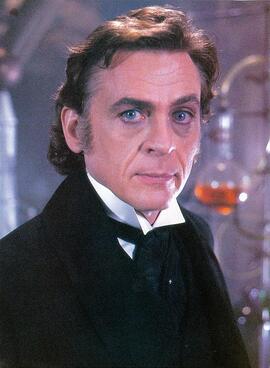
This will probably be the controversial one.
But I’m unapologetic here. Firstly, Daniel Davis is a great Moriarty. In particular, successfully conveying the idea of a pulp villain being given sentience and trying to work out what actually the point of being evil for the sake of evil is, before coming round to the idea of respectability whilst still being dangerous if crossed. Its a strong performance, helped by him sensibly not bothering much with an accent.
It’s also two very clever episodes that successfully exploit the idea of the holodeck in a sensible way (with the first one having the advantage of being only the second holodeck episode), in particular looking at the idea of fandom, role play, what defines life and sentience and makes a villain a villain.
Plus, LeVar Burton’s James Mason impression as Watson is hilarious.
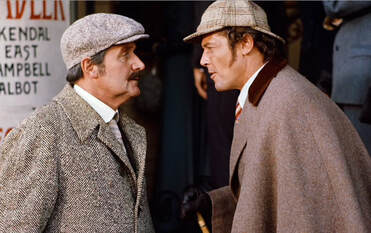
Another one that’s probably only going to be on my list of best Holmes adaptations. Yes, I am a fan of both Sir Roger Moore and Patrick Macnee, so (even with Macnee playing a very dumb Watson and doing an odd voice), its very easy to spend two hours in their company as they investigate a fun, Goldfinger inspired mystery and try to keep Holmes’ bastard son safe.
What I particularly like though, is a lot of modern adaptations lean hard into Holmes’s addictions and character flaws so as to make him more edgy and modern, even though the stories gradually downplay those elements a they went along.
So, even though Moore is arguably hugely miscast (his inability to do a convincing disguise feels like a deliberate gag), just having a straight up heroic straight laced Holmes stomping though the story with strength of character actually feels quite refreshing in 2020.
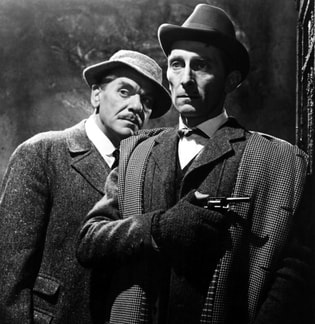
My dark Holmes fan confession is the book of Hound of the Baskervilles leaves me kind of cold, with the title character missing for most of the plot and it probably (as the most famous story) being the reason Watson often gets seen as an idiot due to him being treated rather poorly as a patsy for Holmes throughout.
But I love the Peter Cushing film. Even with the feeling that Christopher Lee should probably be playing Holmes rather than the most British Henry Baskerville of all time.
What makes it work, other than a brilliant cast (Andre Morell is incredible as Watson), is Hammer sensibly ramp up the Gothic horror and sexiness. It’s a lush production that doesn’t piss about, quickly rushing through the story so that you don’t have time to think about how slight it actually is, with a great deal of gleeful joy.
It’s probably the adaptation that comes closest to pulling off the dog as well.
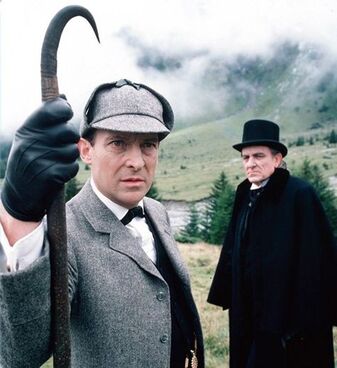
It’s almost too obvious isn’t it, to put a Brett at number one? Indeed, it was more a case of which one. The Red-Headed League; A Scandal in Bohemia and The Sign of Four are just some of the glorious productions the Granada show did.
But The Final Problem is my favourite Holmes story. And this adaptation is perfect. First, it looks gorgeous, not just the by now expected lavish recreation of Victorian London, but the Swiss location filming (including the only Holmes TV or film to actually shoot at Reichenbach Falls!) is incredibly stunning.
It also expands the story in an extremely smart way to fill the hour. The business (presumably inspired by City of Death) with fake Mona Lisas and Holmes avoiding death in Paris isn’t completely necessary, but ramps up the tension nicely.
And once you’re into the pure adaptation of the story, every note is perfect. Including Eric Porter as the best Moriarty, because he doesn’t make him a supervillain, but instead captures the story’s matter of fact little man perfectly, which makes him more scary.
The keystone though is Brett, the best Holmes at his peak, and Hardwick, the best Watson on his way out the door. The real bond of their friendship shines throughout, and the moment Holmes knowingly walks into a trap to protect John, I start blubbing.
And the end, where Watson’s voice-over journal switches to him talking directly to the viewer, is one of the most moving bits of television I have ever seen. Indeed, I would go as far as to say this is one of the greatest episodes of British television ever made. Which makes the move in recent years to experiment more—be it with modern day versions, or an embracing of the pulp side as in the Ritchie films—a sensible idea as the “Pure” adaptation cannot be done any better.
So there’s a list with a few esoteric choices on it. But generally I do enjoy most Holmes stuff, from the silly to the sublime. But once you have eliminated the unwatchable, whatever remains, however filled with average sized hounds in rubber masks, must be a pretty decent way to pass the time.
 RSS Feed
RSS Feed
